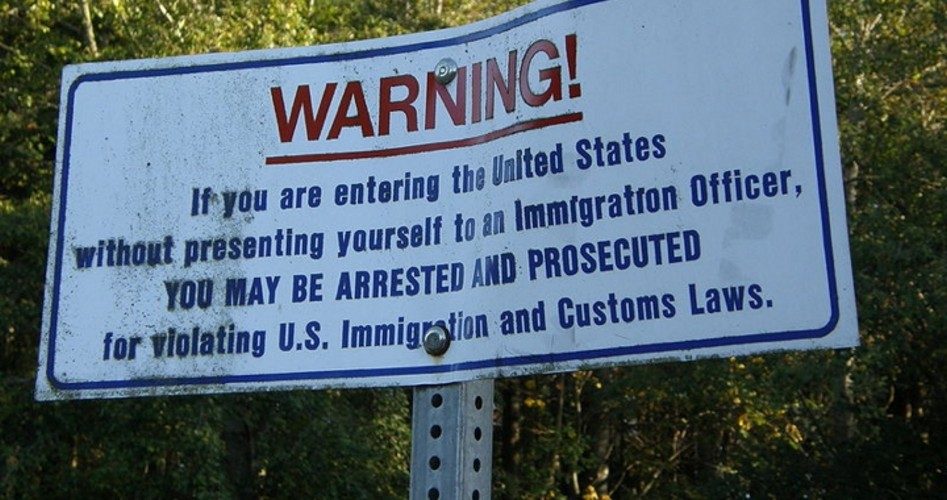
The Senate voted 68-to-32 to pass the long-debated immigration bill on June 27, with 14 Republicans joining 52 Democrats and two independents. The extraordinary protocol for the vote highlighted its importance, with Vice President Biden presiding and the senators voting from their desks.
The New York Times summarized the bill’s key components as providing a 13-year path to citizenship for the 11 million “unauthorized” immigrants in the country, as well as tough border security provisions that must be put in place before the illegal immigrants can gain legal status.
(For AP’s roll call of the vote, click here.)
The Times reported that the “Gang of Eight” group of senators who drafted the bill’s framework delivered supportive speeches prior to the vote, signaling out Sen. Marco Rubio (R-Fla.). When he finished his speech, the other “Gang of Eight” senators gathered around him on the floor, patting him on the back and praising his oratory. “Good job,” said one. “I’m proud of you,” said another.
Rubio’s highly visible role in the process was seen by many as an attempt by the Republican Party to improve its standing among Hispanic voters.
A report in USA Today described the passage of the bill as “a historic step forward for President Obama on one of the most important planks of his second-term agenda.”
Following the vote, the White House released President Obama’s statement commenting on the bill’s passage. It read, in part:
If enacted, the Senate bill would establish the most aggressive border security plan in our history. It would offer a pathway to earned citizenship for the 11 million individuals who are in this country illegally — a pathway that includes passing a background check, learning English, paying taxes and a penalty, and then going to the back of the line behind everyone who’s playing by the rules and trying to come here legally. It would modernize the legal immigration system so that it once again reflects our values as a nation and addresses the urgent needs of our time. And it would provide a big boost to our recovery, by shrinking our deficits and growing our economy.
Today, the Senate did its job. It’s now up to the House to do the same.…
As this process moves forward, I urge everyone who cares about this issue to keep a watchful eye. Now is the time when opponents will try their hardest to pull this bipartisan effort apart so they can stop commonsense reform from becoming a reality. We cannot let that happen.
The Washington Post reported that Thursday’s vote was the culmination of more than six months of negotiations led by the “Gang of Eight,” noting that two of the group’s most high-profile members — John McCain (R-Ariz.) and Chuck Schumer (D-N.Y.) — had worked together as they rarely had in the past.
The Post summarized the bill’s progression through the Senate by noting that following the release of a proposed bill by the “Gang of Eight” in April, the Senate Judiciary Committee spent 37 hours in deliberations spread over three weeks, during which the senators considered almost 300 proposed amendments. Finally, the panel referred the legislation to the full Senate.
However, the reporting on the thoroughness and benefits of the bill seems highly embellished. Though the Congressional Budget Office did claim in a recent report that the immigration law would provide new revenues for government, not a drain on government, the report admits that it did not take into account many costs, such as the future costs of immigrants as they use Social Security and other government benefits. All indications show that the bill will be an economic boondoggle for the country. Also, the CBO reported that, even if the bill works exactly as its sponsors say it will, it will reduce immigration by only 25 percent going forward — hardly a resounding success.
In a recent article, we reported how two of the Senate’s leading opponents to the immigration bill had attempted, without success, to amend it:
A press release sent from [Sen. Ted] Cruz’s office on June 19 noted that the senator had “filed additional amendments to S. 744 [the Border Security, Economic Opportunity, and Immigration Modernization Act introduced by the Gang of Eight] to significantly improve border security measures, fix our immigration system in a manner that champions legal immigration, and uphold the rule of law by ensuring illegal immigrants granted legal status under this bill are not given a path to citizenship.” [Emphasis added.]
“I very much want commonsense immigration reform to pass, but if this bill becomes law as currently written, it will not solve the problem. Instead it will make the problem of illegal immigration worse,” Sen. Cruz said.
The other senator also attempting to put some teeth into the bill was Rand Paul (R-Ky.):
“If [the immigration bill] got stronger, I could consider it, but since they rejected my call to have Congress involved with determining whether the border is secure, I can’t imagine how they can get me back unless they come back to me and say, ‘We’ve changed our mind,’” Paul said. “We would like Congress to be involved in this.”
The Daily Caller reported on Wednesday that the Senate voted 61 to 37 to table Paul’s “Trust but Verify” amendment to the immigration bill that would have required a vote from Congress affirming that border security measures were working before illegal (aka “undocumented”) immigrants could be granted legal status.
Not surprisingly, both Cruz and Paul voted “No” on Thursday.
Following the Senate vote, the immigration bill will go to the Republican-controlled House, where passage is far from assured.
The Chicago Sun-Times quoted from the statement by House Speaker John Boehner (R-Ohio):
Apparently, some haven’t gotten the message. The House is not going to take up and vote on whatever the Senate passes. We’re going to do our own bill through regular order, and it’ll be legislation that reflects the will of our majority and the will of the American people. And for any legislation, including a conference report, to pass the House, it’s going to have to be a bill that has the support of the majority of our members.
Despite Boehner’s strongly worded statement, Senate Majority Leader Harry Reid (D-Nev.) said Thursday that he was “confident” the House would pass the Senate’s immigration legislation.
House Majority Leader Eric Cantor expressed concern that most legislators — including the senators who voted for the bill — don’t know a great deal about what the bill contains. “I can’t tell you what’s in that big Senate bill, and the well over 1,000 or 1,500 pages that it may be, and that’s my concern,” Cantor said in an interview with Yahoo News. “I don’t know if you could ask a lot of the senators what’s in that bill. And that’s my concern.”
The Senate bill just passed included a provision to spend almost $40 billion over the next decade to improve border enforcement, including adding 20,000 new Border Patrol agents and 700 miles of fencing along the southern border. This addition was the result of an amendment proposed by Senators Bob Corker (R-Tenn.) and John Hoeven (R-N.D.). The New York Times noted that that amendment “helped bring along more than a dozen reluctant Republicans, who were hesitant to support the overall bill without a clear plan to secure the southern border, in order to ward off a future wave of illegal immigration.”
However, as we noted in our article, “Permanent Amnesty, Temporary Border”:
Plans such as those produced by the “Gang of 8” often include the promise of border security, in order to mollify the concerns of those who fear that open borders combined with amnesty and generous government benefits for illegals would produce an uncontrollable wave of illegal immigration….
“Border security” has been promised in the past in connection with legalizing illegal immigrants who had already crossed the border. But though amnesty has been provided, the promise of border security remains elusive.
Related articles:



